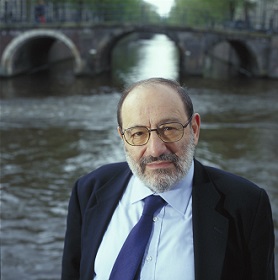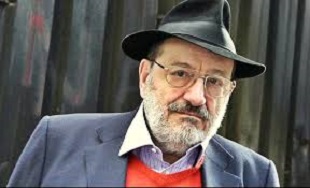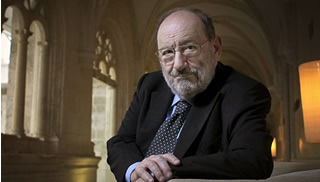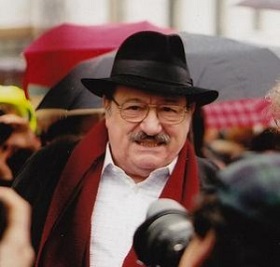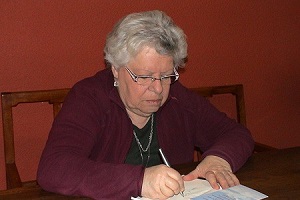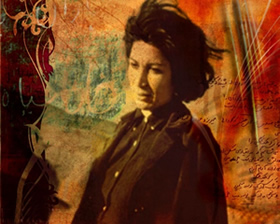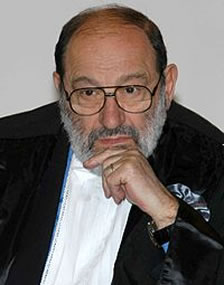De Italiaanse schrijver Umberto Eco werd geboren op 5 januari 1932 in Allasandria. Zie ook alle tags voor Umberto Eco op dit blog.
Uit: Chronicles of a Liquid Society (Vertaald door Richard Dixon)
“The idea of “liquid” modernity or society comes from Zygmunt Bauman. Those who want to understand the various implications of this concept may find it helpful to read State of Crisis, where Bauman and Carlo Bordoni discuss this and other topics.
The liquid society begins to take shape with the movement known as postmodernism, an umbrella term that brings together a great variety of phenomena, from architecture to philosophy to literature, not always in a coherent fashion. Postmodernism signaled the crisis of “grand narratives,” each of which had claimed that one model of order could be superimposed on the world; it devoted itself to a playful or ironic reconsideration of the past, and was woven in various ways with nihilistic tendencies. But postmodernism, according to Bordoni, is also on the way out. It was temporary in character, we have passed through it without noticing, and it will be studied one day like pre-Romanticism. It served to point out an event that was happening and represented a sort of ferry from modernity to a present that still has no name.
Among the characteristics of this nascent present Bauman includes the crisis facing the state: what freedom do nation-states retain when faced with the power of supranational entities? We are witnessing the disappearance of something that used to ensure that individuals could resolve the various problems of our time in a homogeneous fashion. This crisis has led to a collapse of ideologies, and therefore of political parties, and to a general call for a sharing of values that allowed individuals to feel part of something that understood their needs.
The crisis in the concept of community gives rise to unbridled individualism: people are no longer fellow citizens, but rivals to beware of. This “subjectivism” has threatened the foundations of modernity, has made it fragile, producing a situation with no points of reference, where everything dissolves into a sort of liquidity. The certainty of the law is lost, the judiciary is regarded as an enemy, and the only solutions for individuals who have no points of reference are to make themselves conspicuous at all costs, to treat conspicuousness as a value, and to follow consumerism. Yet this is not a consumerism aimed at the possession of desirable objects that produce satisfaction, but one that immediately makes such objects obsolete. People move from one act of consumption to another in a sort of purposeless bulimia: the new cell phone is no better than the old one, but the old one has to be discarded in order to indulge in this orgy of desire.
The collapse of ideologies and political parties: it has been suggested that political parties have become like taxis taken by vote-controlling mob leaders or Mafia bosses, who choose them casually, according to what is on offer — politicians can change party allegiance without creating any scandal. It’s not just people: society itself is living in an increasingly precarious condition.”
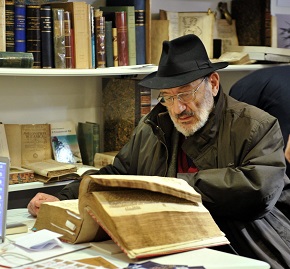
Umberto Eco (5 januari 1932 – 19 februari 2016)
De Nederlandse schrijver, dichter en journalist Joris van Casteren werd geboren in Rotterdam op 5 januari 1976. Zie ook alle tags voor Joris van Casteren op dit blog.
Uit: Het glas van Casanova
“Op een dinsdag in april rijd ik met de auto naar Hoek van Holland. Naast me zit mijn dochter, die anderhalve week later – het is 2008 – vier zal worden. Achterin liggen mijn gedemonteerde fiets, een fietskar, een sporttas met kleding, slaapzakken en een tentje.
Ik tank bij een benzinepomp langs de a4 en koop een blikje cola. In de auto schud ik het, om een of andere reden, waardoor de cola, bij het openen van het blikje, door de auto spuit. ‘Je moet ook niet schudden met cola,’ zegt mijn dochter, gierend van het lachen. ‘Ik heb geen idee waarom ik dat deed,’ zeg ik.
In Hoek van Holland zet ik met plakkerige handen mijn fiets in elkaar. Met mijn dochter in het zitje en onze bagage, de slaapzakken en het tentje in de kar, fiets ik tussen auto’s, bussen en vrachtwagens de veerboot op.
We eten mosselen, garnalen en zalm in het restaurant als de boot begint te varen. Naast ons dineren twee Britten. ‘I admire your courage,’ zegt een van hen als ik vertel wat het doel van mijn onderneming is.
W.G. Sebald maakte in augustus 1992 een wandeling langs de kust van het graafschap Suffolk. Hij passeerde vergeten badplaatsen waar depressieve mensen in krottige huisjes woonden. De wandeling zou centraal komen te staan in De ringen van Saturnus (1995), een mengvorm van autobiografie, reportage en geschiedschrijving, dat op mij – ook vanwege de curieuze, mijmerende manier van schrijven, waarbij volstrekt op zichzelf staande verhaallijnen harmonieus vervlochten raken – een verpletterende indruk maakte.
In het eerste deel van De ringen van Saturnus schrijft Sebald over de door hem bewonderde zeventiende-eeuwse Britse arts en schrijver Thomas Browne. Diens werk typeert hij als volgt: ‘Het is alsof je tegelijk door een omgekeerde verrekijker en door een microscoop kijkt.’ Daarmee levert Sebald tevens een volmaakte omschrijving van zijn eigen werk.”
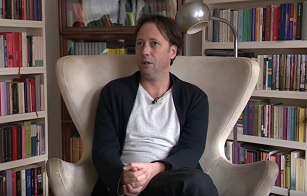
Joris van Casteren (Rotterdam, 5 januari 1976)
De Duitser schrijver, criticus en literatuurwetenschapper Paul Ingendaay werd geboren op 5 januari 1961 in Keulen. Zie ook alle tags voor Paul Ingendaay op dit blog.
Uit: Gebrauchsanweisung für Andalusien
“Lange Zeit war Spanien in der Vorstellung seiner Besucher gleichbedeutend mit Andalusien – und Andalusien mit Spanien. Klischee oder Wahrheit, dort wurden ziemlich starke Bilder heraufbeschworen : von Stierkampf, Zigeunern und Flamencofolklore. Von Abenteurern, dunklen Augen und wildem Temperament. Das Stereotyp des Andalusiers ( und der Andalusierin ! ) hat so viele Jahrhunderte hindurch die Phantasien der übrigen Welt beherrscht, dass der moderne spanische Autonomienstaat, von dem Andalusien nur eine von siebzehn Regionen – und nicht einmal die größte – bildet, kaum dagegen ankommt.
Kleine Kostprobe gefällig ? Die jungen andalusischen Frauen, lese ich in einem hundert Jahre alten deutschen Buch, sind » durchweg anmutige Gestalten mit großen, feurigen, von langen, gebogenen Wimpern beschatteten Augen, üppigem schwarzen Haar, zierlichen Händen und Füßen, reizend in ihrer Art, sich zu kleiden und mit Blumen zu schmücken «.
Verzeihen Sie, dass ich mit den Frauen anfange. Vielleicht hätten erst die Gitarrenspieler oder die Messerstecher kommen sollen. Aber es liegt am Thema. Es geht noch weiter. » Wer Gelegenheit hatte, eine spanische Tertulia zu besuchen «, schreibt derselbe Mann, Francisco Fronner, in seinem Buch Land und Leute in Spanien ( 1912 ), » wird von der unnachahmlichen Grazie, dem zwanglosen Benehmen und der ungekünstelten Koketterie der Andalusierinnen entzückt sein. « Vermutlich war der Verfasser Junggeselle und hatte leicht reden. Wir sollten ihn nicht wörtlich nehmen. Doch der Kern stimmt noch heute.
Das sind Äußerlichkeiten, werden Sie einwenden. Das dachte ich zuerst auch. Aber dann las ich mit wachsender Faszination weiter und erfuhr in diesem Buch, aus welchen Elementen sich nach Meinung von Francisco Fronner – nennen wir ihn Don Francisco, wenn wir es ehrerbietig meinen, oder Paco, wenn wir ihn zu unseren Freunden rechnen – der andalusische Charakter zusammensetzt. Und ich bewunderte Don Franciscos heute eher selten anzutreffenden Mut zur Verallgemeinerung.
Denn die hervorstechenden Eigenschaften des andalusischen Charakters, schreibt er, seien folgende : » Sorgloser Leichtsinn, übermütige Fröhlichkeit, Eitelkeit, Putzsucht ( gemeint ist die weibliche Neigung zu aufregenden Kleidern, nicht zum geschrubbten Küchenboden ), Redseligkeit, Prahlsucht, Dünkel, Spottsucht, Neugierde und Leichtgläubigkeit. « Und jetzt kommt’s : » Zu diesen teilweise nicht sehr empfehlenswerten Eigenschaften gesellt sich jedoch ein gutmütiges, leicht versöhnliches Wesen, höfliche Zuvorkommenheit und Dienstfertigkeit gegen Fremde ( Don Francisco spricht hier mit dem Selbstbewusstsein des wohlhabenden deutschen Touristen ), wohl auch uneigennützige Gastfreiheit, ungewöhnliche Liebenswürdigkeit im Umgange, scharfer Verstand, gepaart mit rascher Auffassung, und eine überschwängliche orientalische Phantasie. ”
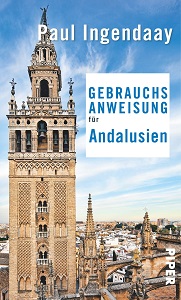
Paul Ingendaay (Keulen, 5 januari 1961)
Cover
De Keniase schrijver Ngũgĩ wa Thiong’o werd geboren op 5 januari 1938 in Kamiriithu, Limuru, Kenia. Zie ook alle tags voor Ngũgĩ wa Thiong’o op dit blog.
Uit: Petals of Blood
“It did not matter that for him, all these years, he had acquired very little. Still he felt a lordly proprietorial air to the structure: was the police not the force that guaranteed that stability which alone made possible the unhindered accumulation of wealth? Everybody, even those millionaires that had ganged together under Kamwene Cultural Organization, really owed their position to the force. The police force was truly the maker of modern Kenya, he had always felt. The Karegas and their like should really be deported to Tanzania and China! But it was people like Munira who really disturbed him. How could Munira have repudiated his father’s immense property? Could property, wealth, status, religion, plus education not hold a family together? What else could a man want? Inspector Godfrey decided that it was religious fanaticism! Yet from his own experience in the police force, such fanaticism was normally found among the poor. Human beings: they could never be satisfied! And yet there was a way in which Munira was right. This system of capitalism and capitalistic democracy needed moral purity if it was going to survive. The skeletons that he himself had come across in the New Ilmorog could not very well come under the label of moral purity. Of course he had seen similar or near similar things in Nairobi, Mombasa, Malindi, Watamu and other places but he had never before given it much thought because, at least so he supposed now, he had never before come across a Munira who was prepared to murder in the name of moral purity. And it was not Wanja’s Sunshine Lodge that Inspector Godfrey was thinking about. It was, for instance, the Utamaduni Cultural Tourist Centre at Ilmorog. Ostensibly it was there to entertain watalii from USA, Japan, West Germany, and other parts of Western Europe. But this only camouflaged other more sinister activities: smuggling of gemstones and ivory plus animal and even human skins. It was a centre for the plunder of the country’s natural and human assets. Women, young girls, were being recruited to satisfy any watalii’s physical whims. The more promising ones, those who seemed to acquire an air of sophistication with a smattering of English and German were lured to Europe as slave whores from Africa! Inspector Godfrey was in no doubt that this lucrative trade in Black Ivory was done with the knowledge of Nderi wa Riera, the MP for the area, for did he not own the centre? He was in partnership with the proprietor, the man from West Germany. Black Ivory for Export: First-rate Foreign Exchange Earner: but couldn’t we do without it, Inspector Godfrey thought, recalling the storm that had burst out when years before a similar trafficking in young flesh had been discovered at Watamu Bay? Maybe he would talk to his superiors about this: maybe he would give them the separate report that he had made.”
Ngũgĩ wa Thiong’o (Kamiriithu, 5 januari 1938)
De Chinese schrijver Xu Xiake werd geboren op 5 januari 1587 in Jiangyin (provincie Jiangsu). Zie ook alle tags voor Xu Xiake op dit blog.
Uit: Randonnées aux sites sublimes (Vertaald door Jacques Dars)
« A ce moment-là, un épais brouillard tour à tour tombe puis se dissipe, nous rendant, à chacun de ses assauts, invisibles l’un à l’autre ! Tous les sommets du mont en Fleur de Lotus, nous les apercevons, pris pour la plupart dans la brume ; pourtant, chose curieuse, durant l’ascension de la Métropole Céleste, lorsque j’avançais, le brouillard était sur mes talons, et lorsque je le franchissais à droite, il surgissait à gauche. Ici, les pins, droits ou torves, parviennent encore à pousser en désordre, mais les cyprès, eussent-ils des branches de la taille d’un bras, sont sans exception aplatis et collés comme des mousses sur les rochers. A cette altitude, les vents sont d’une rare violence, et les brumes et vapeurs vont et viennent sans se fixer ; quand on baisse les yeux vers tous les sommets, on les voit tantôt surgir en crêtes aiguës aux tons d’émeraude, tantôt sombrer dans un océan argenté ; si l’on porte le regard vers la base des monts, on la trouve, elle, baignée de soleil, nimbée d’une lumière cristalline : un autre monde ! Mais le crépuscule approche ; aussi, pieds en avant, mains vers l’arrière et agrippées au sol, nous laissons-nous, assis, glisser vers le bas ; aux endroits les plus dangereux, Source Pure me reçoit des mains et des épaules. Les périls franchis, nous descendons jusqu’à une plate-forme montagneuse, alors que la nuit tombe. De là, nous remontons la gorge par des passerelles de bois, et faisons halte au monastère de Manjusri. »
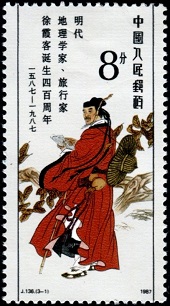
Xu Xiake (5 januari 1587 – 8 maart 1641)
De Argentijnse dichteres en schrijfster Luisa Futoransky werd geboren op 5 januari 1939 in Buenos Aires. Zie ook alle tags voor Luisa Futoransky op dit blog.
Vitraux of Exile
All the efficacy of the names
which the imagery laboriously built up to fascinate you
falls silent:
a rich cemetery of ashes
that, now, is your geography.
You learned at the cost of your youth
and most of your innocence
that to be alone in a forsaken suburb of the pampas
or in splendid Samarkand
holds the same dimension of oblivion or tragedy;
that the wind never took pity scattering
stones and the dead, that only the doomed tourists
take each other’s photos showing off their glass beads
because to say country is to whisper barely seven letters
and through them the density of secret combinations
gravestones of strangers bearing our name
and pale photos that preserve the echo of your passage
toward love or despair.
It’s also the memory of tiring labors
or maybe some old tune
that retains the first risks of your youth.
A country is your name
and the acid violence with which a word comes
to your defenseless traveler’s mouth.
It’s a map with a river whose source and outlet
curiously unite at the exact spot on earth
that your bones wish to fertilize.
It’s daybreaks, insomnias, salutations, anger,
an arm, a shoulder, diminutives, insults,
farewells, gardens, meetings, tremors,
promises, autumns, rails, challenges,
absolute nouns that allow
no other explanation for its weight in ghosts:
these and not others.
Vertaald door Jason Weiss
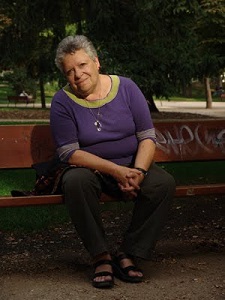
Luisa Futoransky (Buenos Aires, 5 januari 1939)
De Zwitserse schrijver Friedrich Dürrenmatt werd geboren op 5 januari 1921 in Konolfingen. Zie ook alle tags voor Friedrich Dürrenmatt op dit blog.
Uit: Das Versprechen
»Der Hausierer hatte auf einem Bürosessel ohne Lehne Platz genommen, Treuler seinen Stuhl an Matthäis alten Schreibtisch gerückt, der ihm als Stütze für seinen linken Arm diente, dazu die Beine übereinandergeschlagen und den Kopf in die linke Hand gelegt. Er rauchte eine Zigarette. Feiler nahm das Protokoll auf. Henzi und ich blieben in der Türe stehen und wurden von dem Hausierer nicht bemerkt, da er uns den Rücken zukehrte.
›Ich habe es nicht getan, Herr Polizeiwachtmeister‹, murmelte der Hausierer.
›Das habe ich auch nicht behauptet. Ich sagte nur, du könntest es getan haben‹, erwiderte Treuler. ›Ob ich recht habe oder nicht, wird sich ja dann feststellen lassen. Beginnen wir von vorn. Du hattest dich also am Waldrande bequem hingelagert?‹
›Jawohl, Herr Polizeiwachtmeister.‹
›Und geschlafen?‹
›Richtig, Herr Polizeiwachtmeister.‹
›Warum? Du wolltest doch nach Mägendorf.‹
›Ich war müde, Herr Polizeiwachtmeister.‹
›Weshalb hast du denn den Briefträger nach dem Polizisten in Mägendorf ausgefragt?‹
›Um mich zu erkundigen, Herr Polizeiwachtmeister.‹
›Was wolltest du wissen?‹
›Mein Patent war nicht erneuert. Da wollte ich wissen, wie es um die polizeilichen Verhältnisse in Mägendorf stünde.‹
›Und wie stand es um die polizeilichen Verhältnisse?‹
›Ich erfuhr, in Mägendorf sei ein Stellvertreter. Da fürchtete ich mich, Herr Polizeiwachtmeister.‹
›Ich bin auch ein Stellvertreter‹, erklärte der Polizist trocken. ›Vor mir fürchtest du dich auch?‹
›Jawohl, Herr Polizeiwachtmeister.‹
›Aus diesem Grunde wolltest du auch nicht mehr ins Dorf?‹
›Jawohl, Herr Polizeiwachtmeister.‹
›Das ist gar keine so üble Version der Geschichte‹, sagte Treuler anerkennend, ›aber vielleicht gibt es noch eine andere Version, die nur den Vorzug hätte, wahr zu sein.‹
›Ich habe die Wahrheit gesagt, Herr Polizeiwachtmeister.‹
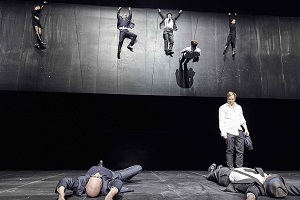
Friedrich Dürrenmatt (5 januari 1921 – 14 december 1990)
Scene uit een toneelbewerking, Düsseldorf, 2017
De Iraanse dichteres Forough Farokhzad werd geboren op 5 januari 1935 in Teheran. Zie ook alle tags voor Forough Farokhzad op dit blog.
Rode wijn danste in de beker
Rode wijn danste in de beker
In zijn blik schittterde de dorst
Mijn lichaam trilde in verrukking
Op het zachte bed van zijn naakte borst
Ik heb gezondigd, een zonde vol genot
Naast een lichaam, bevend zonder woord
O God, ik weet niet wat ik deed
In dit donkere, afgelegen oord.
Vertaald door Nafiss Nia en Ronald Bos
Gezel
De nacht komt
En dan de duisternis
En na de duisternis
Ogen
Handen
En zuchten en zuchten en zuchten…
En het geluid van het water
Dat druppel voor druppel uit de kraan stroomt;
Dan twee rode punten
Van twee aangestoken sigaretten;
Tik tak van de klok
En twee harten
En twee eenzaamheden
Vertaald doorAsghar Seyed-Gohrab
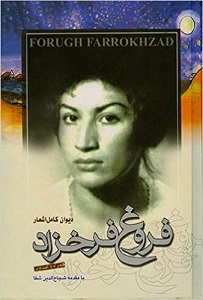
Forough Farokhzad (5 januari 1935 – 13 februari 1967)
Cover
De Hongaarse schrijver László Krasznahorkai werd geboren op 5 januari 1954 in Gyula. Zie ook alle tags voor László Krasznahorkai op dit blog.
Uit: Seiobo There Below (Vertaald door Ottilie Mulzet)
“Everything around it moves, as if just this one time and one time only, as if the message of Heraclitus has arrived here through some deep current, from the distance of an entire universe, in spite of all the senseless obstacles, because the water moves, it flows, it arrives, and cascades; now and then the silken breeze sways, the mountains quiver in the scourging heat, but this heat itself also moves, trembles, and vibrates in the land, as do the tall scattered grass-islands—the grass, blade by blade in the riverbed; each individual shallow wave, as it falls, tumbles over the low weirs, and then, every inconceivable fleeting element of this subsiding wave, and all the individual glitterings of light flashing on the surface of this fleeting element, this surface suddenly emerging and just as quickly collapsing, with its drops of light dying down, scintillating, and then reeling in all directions, inexpressible in words; clouds are gathering; the restless jarring blue sky high above; the sun is concentrated with horrific strength, yet still indescribable, extending onto the entire momentary creation, maddeningly brilliant, blindingly radiant; the fish and the frogs and the beetles and the tiny reptiles are in the river; the cars and the buses, from the northbound number 3 to the number 32 up to the number 38, inexorably creep along on the steaming asphalt built parallel on both embankments, then the rapidly propelled bicycles below the breakwaters, the men and women strolling next to the river along paths that were built or inscribed, into the dust, and the blocking stones, too, set down artificially and asymmetrically underneath the mass of gliding water: everything is at play or alive, so that things happen, move on, dash along, proceed forward, sink down, rise up, disappear, emerge again, run and flow and rush somewhere, only it, the Ooshirosagi, does not move at all, this enormous snow-white bird, open to attack by all, not concealing its defenselessness; this hunter, it leans forward, its neck folded in an S-form, and it now extends its head and long hard beak out from this S-form, and strains the whole, but at the same time it is strained downwards, its wings pressed tightly against its body, its thin legs searching for a firm point beneath the water’s surface, it fixes its gaze on the flowing surface of the water, the surface, yes, while it sees, crystal-clear, what lies beneath this surface, down below in the refractions of light, however rapidly it may arrive, if it does arrive, if it ends up there…”
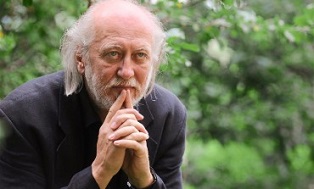
László Krasznahorkai (Gyula, 5 januari 1954)
Zie voor nog meer schrijvers van de 5e januari ook mijn vorige blog van vandaag.

